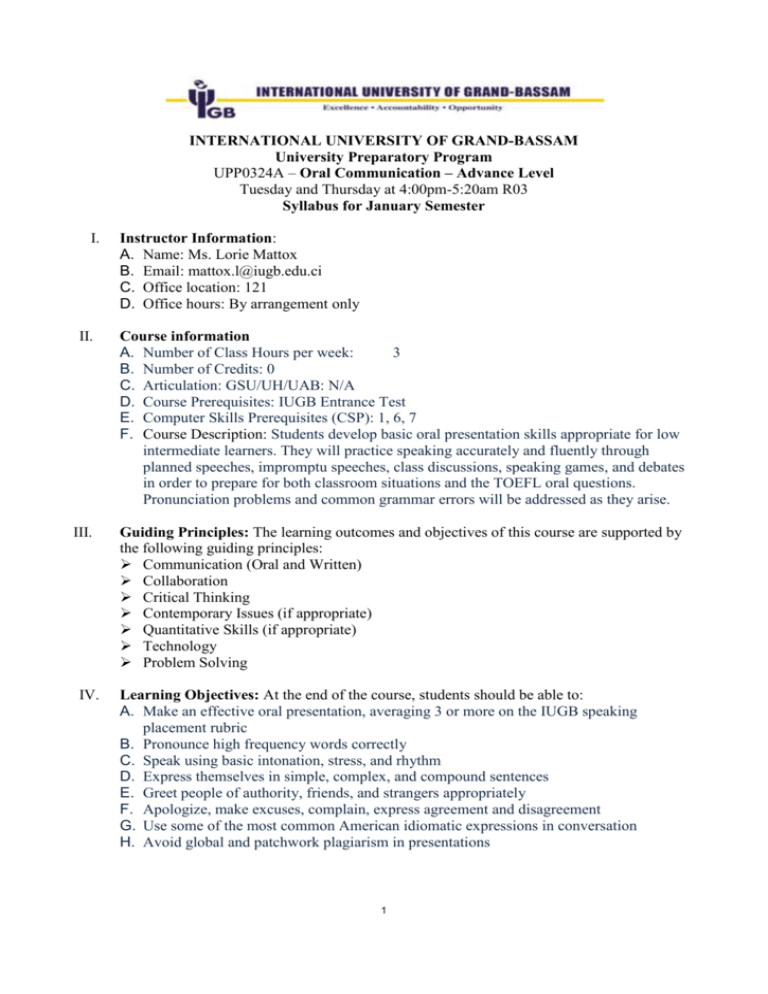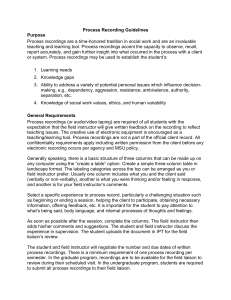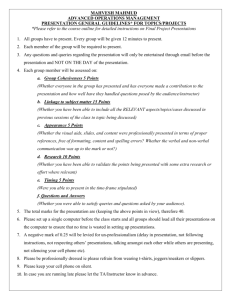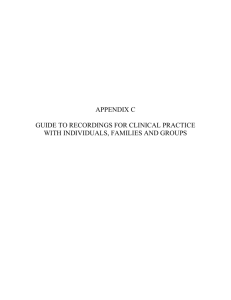
INTERNATIONAL UNIVERSITY OF GRAND-BASSAM
University Preparatory Program
UPP0324A – Oral Communication – Advance Level
Tuesday and Thursday at 4:00pm-5:20am R03
Syllabus for January Semester
I.
Instructor Information:
A. Name: Ms. Lorie Mattox
B. Email: mattox.l@iugb.edu.ci
C. Office location: 121
D. Office hours: By arrangement only
II.
Course information
A. Number of Class Hours per week:
3
B. Number of Credits: 0
C. Articulation: GSU/UH/UAB: N/A
D. Course Prerequisites: IUGB Entrance Test
E. Computer Skills Prerequisites (CSP): 1, 6, 7
F. Course Description: Students develop basic oral presentation skills appropriate for low
intermediate learners. They will practice speaking accurately and fluently through
planned speeches, impromptu speeches, class discussions, speaking games, and debates
in order to prepare for both classroom situations and the TOEFL oral questions.
Pronunciation problems and common grammar errors will be addressed as they arise.
III.
Guiding Principles: The learning outcomes and objectives of this course are supported by
the following guiding principles:
Communication (Oral and Written)
Collaboration
Critical Thinking
Contemporary Issues (if appropriate)
Quantitative Skills (if appropriate)
Technology
Problem Solving
IV.
Learning Objectives: At the end of the course, students should be able to:
A. Make an effective oral presentation, averaging 3 or more on the IUGB speaking
placement rubric
B. Pronounce high frequency words correctly
C. Speak using basic intonation, stress, and rhythm
D. Express themselves in simple, complex, and compound sentences
E. Greet people of authority, friends, and strangers appropriately
F. Apologize, make excuses, complain, express agreement and disagreement
G. Use some of the most common American idiomatic expressions in conversation
H. Avoid global and patchwork plagiarism in presentations
1
V.
Recommended Texts
Sweeny, Simon. English for Business Communication (Student’s Book). London:
Cambridge University Press, 2003. Print.
VI.
Additional Materials / Bibliography
Miller, Sue F. Targeting Pronunciation: Communicating Clearly in English (with CD).
Houghton Mifflin Company, 2006. Print.
VII.
Methodology Used: Various student-centered approaches with activities that encourage
student involvement, motivation, and interest. Students are encouraged to actively
participate in the course.
VIII.
Presentations: Students are required to deliver six presentations. Two weeks before the
presentations are due, the instructor will cover the type of speech student will give. Students
should write out their speech, but they will be graded on the presentation only. The class
will complete peer evaluations for some of the presentations.
IX.
Discussion Forums (7): Students are required to visit the Discussion Forum regularly; 2
relevant, brief or longer, comments per cycle (one early, one later) would be optimal. Each
topic is open for 2 weeks and each relates to course topics or the presentations. Students
will be assigned a topic and will generate questions for discussion. Students may post a
response about the question or respond to another person’s posting. This should be viewed
as an on-line discussion in which persons can post opinions, describe personal experiences,
and pose questions just like during an in-class discussion. Candidates will be required to
post at least 2 times per topic. Students will be penalized for “lumping” all Blog visits on
one day late in a topic cycle. See Appendix A.
X.
Small Talk Recordings: Students are required to record 10 conversations with other
students or assigned speakers. The conversations will target the specific pronunciation skill
focused on during class. Students will evaluate their recordings afterwards to determine how
well they met the specific pronunciation skill. See Appendix B.
XI.
E-Portfolio: Through the semester students should place the following documents and
audio/video files in a Google Site student portfolio (see Appendix C). After setting up your
personal site the 1st week, share the site with your instructor. Each assignment demonstrates
understanding and mastery of the learning objectives.
A. 1 Peer Evaluation on a presentation (student’s choice)
B. 2 written Presentations (student’s choice)
C. 3 recordings of Presentations (student’s choice)
D. 4 Discussion Forums: (student’s choice)
E. 5 recorded Small Talks with student’s self evaluation
F. E-Portfolio assessment: at the end of the semester, students should record themselves
verbally explaining why they chose the particular items for their e-portfolio. Explain
how these items helped improve his or her speaking skills and affirmed/changed their
views of speaking English. This assignment should be posted during the 13th week.
XII. Assessments and Project Description
A. Frequency
B. Weighting of different assessments
Total=100%
2
C. Types and expectations
E-Portfolios 15%
Discussion Forums and Small Talk Recordings 15%
Presentations 20%
Midterm 20%
Final 30%
IUGB Grading Scale
Letter Grade Credit
A+
A
AB+
B
BC+
C
CD
F
K
V
W
WF
I
XIII.
Yes
Yes
Yes
Yes
Yes
Yes
Yes
Yes
Yes
Yes
NO
YES
NO
NO
NO
NO
Quality
Grading Scale
(In Percentage)
Points
4.30
97-100
4.00
93-96
3.70
90-92
3.30
87-89
3.00
83-86
2.70
80-82
2.30
77-79
2.00
73-76
1.70
70-72
1.00
59.5-69
0.00
<59.5
0.00 Credit by Exam Pass/Fail
0.00
Audit
0.00
Withdrawal
0.00
Failing withdrawal
0.00
Check with faculty
General Policies
Students are expected to follow all published IUGB rules and regulations.
The instructor reserves the right to modify the outline and/or the assignments as deemed
necessary to meet certain needs or situations that will arise during the semester.
Students with Special Needs or Disabilities: Please let the instructor know if you have any
special needs and need specific accommodations.
Attendance Policy
Attendance is NOT optional. Students are expected to attend each class meeting and be on
time. Students who have unexcused absences for more than 20% of course meetings will
fail the course. Students may be marked absent if they are ten minutes late, create a
disruption, leave class without permission, leave class early or for extended periods of time,
or take part in forbidden classroom behavior (such as texting, instant messaging, accessing
websites unrelated to class work).
3
Submission of assignments
All assignments for the course are to be completed and submitted on time in order to receive
full credit. Late assignments could incur the loss of 10 pts per day. If an assignment will be
late, please notify the instructor and work out a new submission time.
Make-up policy
Missed work can be made up, only if the absence is excused. You might not be able to make
up some small assignments, for example, those involving group works.
Academic Integrity
Students are encouraged to assist each other in mastering the concepts and skills covered in
the course. However, an individual assignment, group project, a quiz or an exam submitted
by a student fulfilling the requirements of this course must be the result of that student’s
personal effort, and not copied from another work or performed by anyone else. Any student
who cheats, plagiarizes, or performs any other act of academic dishonesty is guilty of
academic misconduct. Any academic misconduct in this course will be dealt with according
to IUGB’s academic misconduct policy and will result in an automatic “F” for the
assignment. A repeated offense will result in course failure and be reported to the UPP
director. If you have any questions about what might be considered plagiarism, please ask
your instructor, librarian, or writing lab tutor.
Classroom conduct
Respect of instructors and fellow students is very important.
Use of cell phones, I-pods, etc is strictly prohibited during class unless they are being used
legitimately for a class assignment. No text messaging during class! Phones should be
turned OFF during the class period. Improper use of electronic devices will lower your class
participation grade or cause you to be marked absent.
Students who are dressed in a distracting manner will be asked to leave class and be marked
absent.
Assistance with course
This may be arranged either directly with the instructor, or through the Advisory Process
XIV. Faculty Biographical information
As a Texan, I understand the importance of hard work, encouragement and pride. In school,
I’ve always worked hard to not only make good grades but to apply and test the things I’ve
learned. After graduating with a BA in English, specializing in Technical Writing, I had the
opportunity to work in Ghana and Zambia producing a variety of publications, including
literacy materials. I then returned to the US to work in a publishing house. Also around this
time I started teaching a community conversational English class and learned the importance
of encouragement. Learning a new language is a stressful exercise, and I constantly
reminded my students this was a feasible task. This eventually led to my decision to work on
my MA in Education focusing on adult ESL. After graduation, I taught part-time and had
the opportunity to see many of my students enter the work force or university as their
English levels improved. I see my students as future world leaders and have a deep sense of
pride in all that will be accomplished. I look forward to seeing these same qualities in you,
your hard work to master English, encouraging each other on this journey and pride in
4
yourself as you accomplish this task. I believe that each of you will have an important part
in the future.
XV.
Course Outline
Class
Homework
WEEK 1
Day 1
Intro to course
Small talk (discussion forum & small talk
recordings)
Discussion Forum 1: What do you want to
get out of this course?
EBC Reading: p. 6-7 Eye Contact
Prepare All About Me presentation
Day 2
All About Me Presentations
EBC: Unit 1 Building a relationship
Welcomes
Small talk
WEEK 2
Day 3
TP1: Improving your Pronunciation
Day 4
EBC: Unit 2 Culture and entertainment
Impromptu Speech overview
Small Talk recording 1
EBC Reading: p. 14-15 The Impact of Culture
on Business
Discussion Forum 2: What kinds of social
activities in Abidjan could be appropriate
ways to entertaining visitors from other
countries?
WEEK 3
Day 5
TP2: Pronunciation Basics
Receive Impromptu Speech topic
Day 6
Impromptu Speech presentation
Small Talk recording 2
Prepare Impromptu Speech presentation
WEEK 4
Day 7
TP3: Stress Syllables and Speaking Clearly
Day 8
EBC: Unit 3 Could I leave a message?
Personal Narrative overview
Small Talk recording 3
EBC Activity: p. 25 Preparing to make a
telephone call #3
Discussion Forum 3: discuss the implications
of the cartoon on p. 29 The secretarial
barrier. Tell if you have dealt with a
secretary or if you’ve had to be the
secretary.
Prepare Personal Narrative presentation
5
WEEK 5
Day 9
TP4: Intonation Patterns
Small Talk recording 4
Prepare Personal Narrative presentation
Day 10
Personal Narrative presentation
WEEK 6
Day 11
TP5: Speech Rhythm
Small Talk recording 5
COC Reading: p. 35 Telephoning across
cultures #2 & 3
Day 12
EBC: Unit 4 Good to hear from you again!
Discussion Forum 4: Discuss the importance
of following up an informative telephone call
with an email?
WEEK 7
Midterm Review/Midterm
WEEK 8
Day 15
TP6: Vowels & speech music
Small Talk recording 6
COC Reading: p. 64-66 Using visual aids:
general principles # 1, 2, 3 & 4
Day 16
EBC: Unit 7 Image, impact and making an
impression
Demonstration Speech overview
Discussion Forum 5: Tell about a time when
a visual aid malfunctioned or did not suit the
presentation. How did you feel as an
observer? How would you have handled the
situation?
Prepare Demonstration Speech presentation
(pairs)
WEEK 9
Day 17
TP7: The melody of speech
Small Talk recording 7
Prepare Demonstration Speech presentation
(pairs)
Day 18
Demonstration Speech presentation
W E E K 10
Day 15
Spring Break (Mon & Tues)
No Class Mon & Tues
EBC Reading: p. 103-104 The structure of
decision making #1, 2 & 3
Day 16
EBC: Unit 11 Sorry to interrupt, but…
Persuasive Speech overview
Discussion Forum 6: Think of a decisionmaking meeting that you participated in
recently, and identify a structure to the
6
decision-making process.
Prepare Persuasive Speech presentation
W E E K 11
Day 17
TP8: Speech pathway
Small Talk recording 8
Prepare Persuasive Speech presentation
Day 18
Persuasive Speech presentation
W E E K 12
Day 19
TP9: Important Endings
Day 20
EBC: Unit 14 Getting what you can
Informative Speech overview
Small Talk recording 9
EBC Reading: p. 132-134 Bargaining and
making concessions #1 & 2
Discussion Forum 7: Think about a recent
personal bargaining experience in a nonbusiness situation. What principles can you
apply from that experience to a business
situation?
Prepare Informative Speech presentation
(groups)
W E E K 13
Day 21
TP10: More vowels and consonants
Small Talk recording 10
Prepare Informative Speech presentation
(groups)
Day 22
Informative Speech presentation (groups) E-Portfolio assessment
W E E K 14
Review
W E E K 15
Day 25
Final
7
Appendix A: Discussion Forums
After beginning a new topic in class, the instructor will post a class discussion question on Edu2.0.
Students will have two weeks to provide a response to the question and at least one comment to
another student’s response. Students may need to wait until the second week to post a comment to
another student’s response. Students are encouraged to comment more than once as an opportunity
to practice writing in English.
Under this class in Edu2.0, click on Forums in the left hand menu. The instructor will begin a
thread with a question or statement that students will respond to. Student responses need to be well
thought out, substantial, and cover the topic. Once students have responded, be sure to click the
Subscribe button to receive alerts to postings to your response.
Appendix B: Small Talk recordings
Students need to locate a voice-recording program or app for recording Small Talks. The program
needs to have the ability to mail the recording to student’s email address and e-portfolios. Most
smart phones come with a program. Apps can be found for Android or Apple tablets. Computer
programs can also be found. A good free program is Audacity (http://audacity.sourceforge.net).
8
Appendix C: E-Portfolios
E-portfolios are electronic folders showcasing a student’s best work. It is an effective tool to allow
students to self-monitor their progress over the semester. In this course, you will create an eportfolio though Google Sites. This will allow you to access your portfolio along with your IUGB
gmail account.
Directions for creating a Google Sites e-portfolio:
1. Sign into your IUGB gmail account, but don’t select Mail.
2. Click on the symbol (
) and choose Sites from the pull down menu.
3. Click on Create in the left hand menu.
4. Use your name in the Name Your Site box (ex: Aly Gbane)
5. Under Select a Template to Use, choose a Blank Template or Browse the Gallery for More.
6. Once you have selected your template, click Create.
This will provide you the first page of your e-portfolio. You should create an introduction for
yourself on the main page. Then create your table of contents for the left hand side menu. Your
table of contents should include the title of this course UPP0224 and any other courses where
instructors ask students to create a Google Sites e-portfolio.
Typing text for the introduction:
1. Click on the pencil image or Edit Page (s) button.
2. Click on the text box and begin typing your introduction information.
3. When you are finished, click on Save.
This provides your home page. To add, delete, copy or move pages, click on the “gear” image or
More Actions button.
To share e-portfolio with others:
1. Click on the “gear” image or More Actions button.
2. Select Sharing and Permissions.
3. In the Invite People box, type my email address (mattox.l@iugb.edu.ci). You can only add
addresses that end in @iugb.edu.ci.
4. Click Send.
An invitation will be sent to all the email addresses you entered. They will need to accept your
invitation before they can access your site.
The above three steps need to be completed by Week 2!
This is just the basic information about setting up a site. You will need to take the time to play with
the site to see what it does and how to personalize it to your tastes. Have fun!
9
Appendix D: Reflection Journal Worksheet
Reflection Journal Worksheet
Keeping a journal about your speaking and listening experiences will increase your awareness about
your own pronunciation and provide a record of your progress.*
SAMPLE JOURNAL ONE
Goal: To improve word stress
Reflection: In class this week, I noticed that the rubber band helped me a lot to lengthen the
stressed syllable. I decided to write down some words that I use at work: publicity, marketing,
agreement, feasibility study, and sustained growth. I marked the stressed syllables. I made a real
effort to stretch out the stressed syllables using my rubber band. Then I made up sentences with the
words and recorded them. When I listened, it sounded better, but I made another recording anyway.
I tried to say those words more correctly at work and was thinking about my speech when I said
them.
SAMPLE JOURNAL TWO
Goal: To improve my ability to describe events and pick out the important words
Reflection: I took a series of photos at my sister’s wedding and decided to put them in the order of
what happened so I could tell the story of her wedding. Then I began to tell the story. I tried to
stress the focus word in each sentence and use pauses. The kind of practice was very helpful. I
taped myself telling the story about the wedding. Then I found some other pictures I had taken of
some places we went this summer, and I did the same thing.
JOURNAL ASSIGNMENT
1. Keep a weekly journal related to your speech. Your journal should reflect your personal goals,
interests, and experiences. Choose an activity that you are interested in.
Sample listening activities: listening to students or the instructor in class
listening to conversations, news, or interview programs on TV or the radio, or to the speech
of neighbors or friends
taping and listening several times to your favorite TV program
Sample speaking activities: picking out words that you say frequently at work emphasizing
the stressed syllables
practicing your pronunciation in social situations (making plans, talking at a party, inviting a
friend for a movie)
talking in the community (getting information, shopping)
recording your speech, listening for corrections, and re-taping it
Sample goals: to lengthen stressed syllables, to listen for pauses and focus words, to say final
“ed” and “s”, to pause more, or to use more speech melody
2. Write your journal entry on your computer. Describe in your own words what happened and
how it helped you. How successful was it?
3. Send a copy of your journal to your instructor by e-mail---either in a letter or as an attachment.
Print out your copy each week and bring it to class. We will spend a few minutes in class
talking about the journals and what happened.
Copyright © Houghton Mifflin Company. All rights reserved.
10
Appendix E: Talk Times and Small Talk Worksheet
Talk Times and Small Talk Worksheet
1. Talk Times Targets. Write the targets you plan for each Talk Times activity.
Examples: Monday-word stress. Friday-focus.
2. Situation. Write where you were and whom you were talking to.
Examples: at work-John, at a market-clerk, at the movies-person in line.
3. Notes. Describe your plan, what you said, and what happened when you said it.
4. Comfort level. Rate 1-10. 1=least comfortable 10-most comfortable.
DayTalk Times
Targets
Situation
Where and with
whom?
Notes
Describe your plan
and what happened
Copyright © Houghton Mifflin Company. All rights reserved.
11
Comfort Level
1-10
12
STUDENT INFORMATION SHEET
Name _______________________________________________________________________
Preferred Name for Class (only pick ONE) _________________________________________
Cell #___________________________
Residence: Bassam _________
IUGB E-mail______________________________
Abidjan _________
Other ________________________
EDUCATION:
How much experience do you have in using English? ___________________________________
______________________________________________________________________________
How much English did you have in school? __________________________________________
______________________________________________________________________________
LANGUAGES AND CULTURES:
Your first language(s) - native language or mother tongue: ______________________________
What other languages do you know and how (where and when) did you learn them:___________
______________________________________________________________________________
Travel Abroad: _________________________________________________________________
______________________________________________________________________________
Study/work/life experiences in other countries: ________________________________________
______________________________________________________________________________
13





